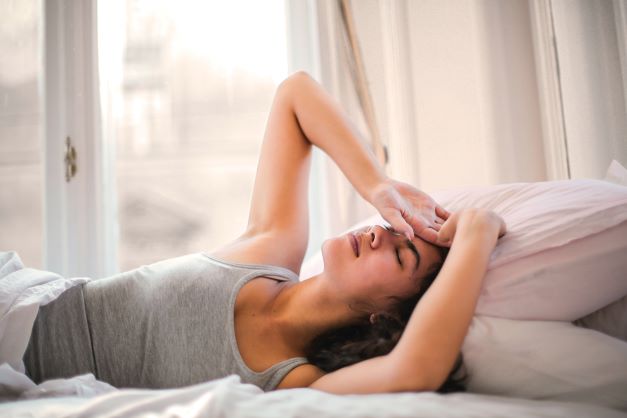
In our fast-paced society, a good night’s sleep is essential to productivity. Yet, many of us struggle nightly with insomnia. In fact, an estimated 30 to 40 percent of adults have occasional insomnia, and 10 to 15 percent have chronic insomnia.
If you’re looking for a natural way to help yourself drift off to dreamland, aromatherapy treatments might be able to help. Aromatherapy can’t cure serious sleep disorders like narcolepsy or sleep apnea, but it can be quite helpful in promoting a calm and relaxed state that will combat occasional sleeplessness.
About Insomnia
There are many possible causes of insomnia, including stress, anxiety, depression, medications, poor sleeping habits, and medical conditions. Insomnia can also be a symptom of another sleep disorder, such as sleep apnea.
The most common symptom of insomnia is difficulty falling asleep. Other symptoms may include waking up frequently during the night, waking up early in the morning, and feeling unrefreshed after a night’s sleep.
Insomnia can lead to daytime fatigue, irritability, and difficulty concentrating. It can also cause or worsen other health problems, such as depression, anxiety, and high blood pressure.
Many people with insomnia turn to sleep aids, such as sleeping pills, for relief. But sleep aids can have side effects and only offer short-term relief. If you’re looking for a more natural way to improve your sleep, consider using essential oils.
How Can Essential Oils Help Me Sleep Better?
Essential oils are derived from plants and have been used for centuries to treat a variety of conditions. Some essential oils have calming and sedative effects that can be beneficial for people with insomnia.
In addition to promoting relaxation, essential oils can also improve sleep quality by:
- Reducing stress and anxiety
- Easing muscle tension
- Clearing nasal congestion
What Are the Best Essential Oils to Treat Insomnia?
There are a variety of essential oils that can be used to treat insomnia. The best essential oil for you will depend on your individual needs and preferences.
Some of the most effective essential oils for insomnia include:
- Lavender essential oil: Lavender oil is regularly referred to as one of the most useful essential oils, because it is helpful in treating insomnia, as well as conditions such as acne, allergies, asthma, burns, itching, hypertension, migraine headaches, and stretch marks.
- Clary sage: This essential oil also has natural sedative properties. Clary sage essential oil is earthy with a subtle fruity note. It’s often used to treat stress as well as insomnia.
- Chamomile essential oil: Roman chamomile oil is a natural sedative with a bright, crisp, and sweet scent.
- Valerian essential oil: Valerian oil is an effective essential oil for insomnia. It’s often used in combination with other essential oils, such as lavender oil.
- Bergamot essential oil: Bergamot oil is another essential oil that can be used to treat insomnia. It’s known for its calming and relaxing effects.
- Ylang ylang essential oil: Ylang ylang oil is an effective essential oil for insomnia. It’s known for its ability to promote relaxation and reduce anxiety.
Essential oils can be blended together to increase their effectiveness. For example, a blend of lavender oil and chamomile oil is a popular choice for nighttime relaxation.
How Can I Use Essential Oils to Treat Insomnia?
There are several ways that you can use essential oils for insomnia.
Essential oils can be used in several different ways to promote restful sleep. For example:
- Add essential oils to a diffuser near your bed. Three to five drops of your favorite soothing oil should be sufficient.
- Massage your feet and legs with a massage oil made from one ounce of sweet almond oil and 10 to 12 drops of lavender, Roman chamomile, or clary sage essential oil. Use 1 teaspoon of oil for each massage.
- Create a soothing bed linen spray to add to your sheets and pillows. Add 30 drops of essential oil, 1 1/2 ounces of vodka, and 1 1/2 ounces of distilled water to a spray bottle with a fine mist setting. Lightly spray the solution on your linens shortly before you go to bed.
- Add essential oils to your bath water. Combine 20 drops of lavender essential oil with 2 ounces of a carrier oil such as jojoba oil. Mix well, then add 1/4 ounce to warm bath water.
When using essential oils for insomnia, you should start with a low concentration and increase as needed. If you experience any irritation, discontinue use and consult a healthcare professional.
Some people may have added concerns associated with essential oil use. For example, pregnant women and young children should always consult a healthcare professional before using essential oils. Consult your healthcare provider for further guidance.
What Other Home Remedies Can Help With My Insomnia?
There are a number of other home remedies that can help with insomnia, including:
- Exercise: A moderate amount of exercise can improve sleep quality by helping to reduce stress and anxiety levels. However, avoid exercising too close to bedtime as this can make it harder to fall asleep.
- Relaxation techniques: Relaxation techniques such as yoga, meditation, and deep breathing can help to reduce stress levels and improve sleep quality.
- Herbal teas: Herbal teas such as chamomile or lavender tea can promote relaxation and help you to drift off to sleep.
If you regularly find it difficult to sleep or if you are not feeling rested after a night’s sleep, it is important to speak to a doctor. Insomnia can be a symptom of an underlying health condition and there are treatments that can help.